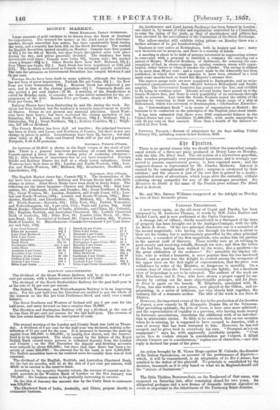64t aCratrts.
There is no special reason why we should follow the somewhat complicated details of a three-act piece produced at Drury Lane on Monday, with the title The Black Book. The old notion of a. mysterious guardian, who watches perpetually over persecuted, innocence, and is wrongly suspected to possess supernatural power, is here repeated anew ; and the supposed &omen is represented by Mr. Charles Mathews. Interest is created by the entanglements of the plot ; surprise is awakened by their solution ; and the success is just of the sort that is gained by a neatlyconstructed story of adventures, which keeps alive the curiosity, without enlisting strong sympathy for any of the personages presented. Les Me noires du Diable is the name of the French piece whence The Black Book is derived.
Mr. and Mrs. Barney Williams reappeared at the Adelphi on Monday in two of their favourite pieces.
PARISIAN TILEATRICALS.
A new comic opera, on the old story of Cupid and Psyche, has been composed by M. Ambroise Thomas, to words by MM. Jules Barbier and Michel Carre, and is now performed at the Opera Comique.
A strange tale of villany, chiefly manifested in a disregard of the laws , of property has been brought out at the Ambigu-Conaique, with the title La Route de Brest. Of the two principal characters one is a scoundrel of the second magnitude who having run through his fortune is about to blow out his brains, but is unfortunately preserfed by the other principal character, a scoundrel of the first magnitude, who makes him his partner in the ancient craft of thievery. These worthy men go on robbing in good society and receiving rebuffs, through ten acts ; and then the better of the bad two, having been stabbed by the worse dies a penitent—to the great edification of the audience ? No I unluckily the blacker villain, who is withal a humorist, is more popular than his less hardened friend ; and so great was the delight he created among the occupants of the upper tiers on the first night of representation, that the piece was withdrawn by order of the Minister, as dangerous to morality,. On a certain class of vices the French censorship site lightly, but a facetious view of brigandage is not to be tolerated. The authors of the work are MM. Brisebarre and E. Nus; who have shown a proper regard for authority by cutting out the more objectionable passages, and La Route de Brest is again on. the boards. M. Brisebarre' associated with M. Nyon, has also written a new piece, now played at the Odeon and re presenting, in a series of tableaux, not very closely knit together, the ordinary life of a dramatic author. The title of the work is Les Gens de Ths'Atre.
However, the important event of the day is the production of La Question d'Argent, a new comedy by M. Alexandre Dumas file, at the Gymnase. That prevailing epidemic, the love of lucre, is here once more satirized ; and the representative of cupidity is a parvenu, who having made money by fortunate speculations, entertains the additional wish of an introduction to aristocratic circles. So little is he esteemed, that on one occasion when he is missing, he is supposed to have escaped to America, with a sum of money that has been intrusted to him. However, he has not escaped, and he gives back to everybody his own. " Pourquoi ma-t-on soupconne ? " says he with apparently justifiable surpnse. " Vest qu'au lieu de vouloir obtenir la consideration par Pargent,
obtenir l' argent par la consideration," replies one of characters,—and this reply is deemed the point of the piece.
An action brought by M. Victor Hugo against M. Calzado, the director of the Italian Operahouse, on account of the performance of Rigolettowhich, it will be remembered, is an adaptation of Le Boi s'Amuse, has resulted in the defeat of the plaintiff. No principle is established by the decision, inasmuch as it is only based on what we in England should call the "statute of limitations."
The little Tlititre Beaumarchais, on the Boulevard of that name, was reopened on Saturday last, after remaining closed for two years. An allegorical prologue and a new drama of dramatic interest signalize an event so important to the inhabitants of the Faubourg Saint-Antoine.


































 Previous page
Previous page